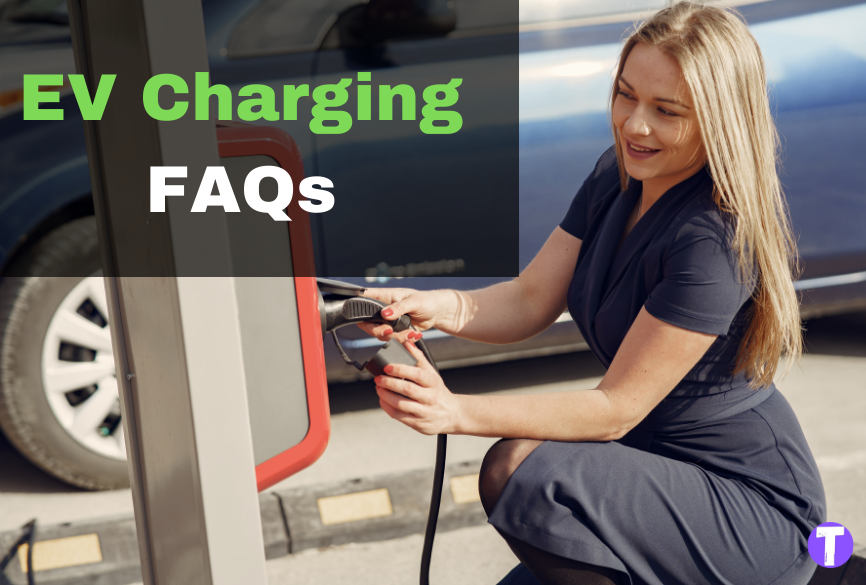The United States is making major strides when it comes to electric vehicle (EV) charging stations. In the past year, there’s been a 37% increase in EV chargers. Some of the reasons for this are placing chargers in public spaces like airports, hotels, and grocery stores or installing them as part of municipal projects for city center developments or even as part of green residential development.
The U.S. electric vehicle charging infrastructure market size was valued at USD 2.85 billion in 2021 and is expected to advance at a compound annual growth rate (CAGR) of 36.9% from 2022 to 2030. (Source-Grand View Research)
The United States is experiencing a power shift as electric vehicles (EVs) are replacing traditional gas-powered cars. Public charging stations are popping up across the country to accommodate this change in transportation and power consumption.
Here are 10 frequently asked questions related to EV charging in the united states.
EV Charging: 10 Most Frequently Asked Questions


1. What is EV Charging?
EV charging is the process of charging an electric vehicle with electricity. There are two types of EV chargers, Level 1 and Level 2. Level 1 chargers can be found in homes while level 2 chargers have to be installed at businesses or at charging stations.
Level 1 chargers take up to 12 hours to fully charge the battery while level 2 chargers take 6-8 hours which is much faster.
2. How does EV Charging work?
Electric Vehicles (EVs) are becoming more popular and widely used. One of the reasons is that EVs are less expensive than conventional vehicles plus they have lower emissions.
Electric vehicles are on the rise, but there are still some who have misconceptions about how they work. The battery for an electric vehicle needs to be charged and this can be done at home or at the workplace. It is important that people know how the system works in order to understand how they can charge their electric vehicles when they need it.
3. What is the average life of a Level 2 home charger for an electric car?
The average lifespan of a level 2 charger for an electric car is five years. A user can expect the battery to last about 530 miles before it goes dead, which is the average range of a fully charged battery.
4. Do electric car charging systems contain microprocessors?
Electric car charging systems have one or more microprocessors to control the flow of power between the battery, converter, and charge point.
5. How can I become a distribution center and installer of EV chargers?
The rapid adoption of electric vehicles poses an exciting opportunity for distribution centers and installers of EV chargers. However, these opportunities are not without their challenges. For one, distribution centers must invest in the charging infrastructure before they can reap the benefits of this new trend. The charger installation process is also not without its own setbacks such as specific requirements for power supply, installation location, and alignment with local ordinances.
6. What are the first things I need to do to set up my electric vehicle charging station installation business?
While setting up a new business can be hard, there are some things you should do before you get started. One of the first things to do is to make sure your business is set up as a corporation or LLC. You will also need to find a suitable place for your business, such as an office or warehouse space.
ALSO READ- Factors to Consider When Choosing A Reliable Auto Repair Shop
7. Do I need to install the EV charging station near a propane tank?
When installing an EV charging station near a propane tank, you need to take a few safety precautions. You should always consult your propane company and follow their instructions before installing the EV charging station near the propane tank.
8. Can I charge an EV with a regular 20A battery charger?
The short answer is no. If you plug a regular 20A battery charger into your electric vehicle (EV), the electrical system will immediately sense the difference in the incoming voltage and current and cut out.
9. Can I charge a battery pack from an EV charging station?
Charging an EV battery pack is not the same as charging your phone. The charging station is constantly supplying power while you’re driving. You can charge your battery pack when you park your car and leave it plugged into the station.
10. Do I need an electrical permit to install a 50-amp, 240-volt EV charger in my home?
Absolutely! A permit is required for any installation of a new electrical service. Even if the charger is 240V, you’ll need a permit to install it.
Wrapping Up
Electric cars are becoming more prevalent in the world. With this increase in popularity, many people are looking for electric car charging stations. These charging stations are necessary for all-electric cars because they use an electric battery as their primary power source. There are many different types of EV chargers, one of which is the level 2 charger, which draws a lot less power than a level 1 charger.
We hope you enjoy reading the 10 Most Frequently Asked Questions related to EV charging.
Thank you, keep reading!































